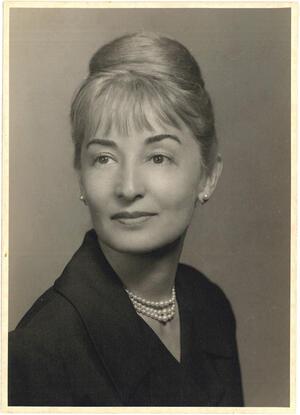Death of Carolyn Goodman, not just a Jewish mother
Courtesy of the Andrew Goodman Foundation.
“[Carolyn Goodman] deserves even more to be remembered for her own part as a role model, not just as a Jewish mother, but as an activist and as a force for justice.” So wrote her Queens College colleague Jeremy Burton after her death on this date in 2007.
Thrust into the national spotlight when her son Andrew disappeared with two other young men working on the Freedom Summer project in 1964, Carolyn Goodman first appeared as the mother of a missing son, later found shot and buried in an earthen dam in Mississippi. During those days, she was a force agitating for a wrong to be made right. “I'm not looking for revenge, but I am looking for justice," she said at the time. She looked for and created justice for the rest of her life.
Born in Woodmere, N.Y., on Oct. 6, 1915, Carolyn Elizabeth Drucker earned a bachelor’s degree in home economics from Cornell University in 1936, a master’s in clinical psychology from the City University of New York in 1953 and a doctorate in education from Columbia University Teachers College in 1968. In 1966, Dr. Goodman and her husband, Robert Goodman, started the Andrew Goodman Foundation, which uses community organizing tools to create “a new hero citizenry: ordinary individuals engaged and committed to creative and effective action for social impact.” Goodman lectured to student and religious groups, took an active role in antiwar demonstrations, and marched in civil rights rallies.
Professionally, Goodman was a healer, known for her patient generosity of spirit with those she met. As a psychologist, Dr. Goodman specialized in creating early intervention programs for families at risk of psychiatric problems. She developed and ran the PACE Family Treatment Center, a program for emotionally disturbed mothers of young children, at the Bronx Psychiatric Center.
Ruth Messinger, President of the American Jewish World Service, recalled, “Often and painfully she said in interviews that she believed that even if she had known the outcome she would have let Andy go to Mississippi. Messinger remembered her words: “I still feel that I would let Andy go to Mississippi again. Even after this terrible thing happened to Andy, I couldn’t make a turnabout of everything I believe in.”
Watch an interview with Carolyn Goodman from 2004, recorded shortly before her testimony in the murder trial of former Klansman Edgar Ray Killen. Hear an interview with Brad Herzog, the editor of her memoir My Mantelpiece.
Sources: “Carolyn Goodman, Rights Champion, Dies at 91,” New York Times, August 18, 2007; “The Unforgettable Presence of Carolyn Goodman,” Andrew Goodman Foundation; “Carolyn Goodman, Mother of Civil Rights Activist,” NY1; “Brad Herzog joins to discuss Carolyn Goodman’s My Mantelpiece,” Michelle Jackson Show.



